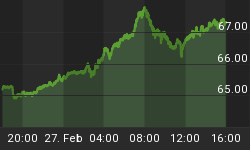Below is a snippet from the latest weekly issue from www.GoldForecaster.com | www.SilverForecaster.com.
Oil is priced in the U.S. $, which makes it one of the vital interests of the U.S. Without this backing to the $ we have no doubt the path of the $ to the global reserve currency would have been impaired and be undergoing a major attack by now. The thought of oil being priced in currencies other than the $ poses a threat to the credibility of the U.S.$ of major proportions. Any talk of a switch to pricing in other currencies [let alone an actual switch] poses a threat to the U.S. $ in its reserve currency role. This threat is now a real one and poses a considerable danger to the $ in time. But it is unlikely to come from the up-coming Gulf Cooperation Council meeting shortly to take place.
It appears the Gulf Arab oil producers are to review the currency pegs to the U.S.$ of their currencies and may change their pricing of oil to other currencies. This could happen as early as March according to the United Arab Emirates central bank. The Governors of the six Gulf central banks will meet in March in Saudi Arabia and may agree to switch to another currency or currency basket, Governor Sultan Nasser al-Suweidi said. But then again, they may decide leave the pegs as they are with any new changes requiring the approval of the Gulf Arab rulers.
The six members of the Gulf Cooperation Council (GCC) -- UAE, Saudi Arabia, Kuwait, Qatar, Oman and Bahrain, are working toward monetary union [a single currency]. Oman placed these discussions in jeopardy last month, saying it would not join in 2010. Suweidi said the governors could opt for more flexible exchange rates, instead of the fixed pegs now maintained by all states except Kuwait, which revalued its currency last year. They may decide to peg to another currency or basket of currencies, he said, declining to comment on what currencies were being considered.
Because Saudi Arabia accounts for about half the G.C.C.' gross domestic product and 58% of oil production their input on this subject is the most important, so we will not accept this possibility until we hear from Saudi Arabia itself on the matter. It is doubtful that any change of currency in pricing Middle East oil will happen, for the Saudi's are, in reality, completely dependent on the U.S. for their continued security. So such an offense to the U.S., which is the way it would be perceived, is most unlikely.
So this event does not pose a real threat to the $. The fact that the issue is being put on the table is describing the uncertain, present global currency scene we see before us. It is getting worse as we will consider further in our future issues, with China now set to take real action to lower their vulnerability to the U.S.$.
With oil a real 'currency' in the definition of the word, oil producers of O.P.E.C. have 'revalued' it by helping prices to rise [that is until the weather devalued it recently] to present levels of $53+ a barrel. But at issue in these discussion is the hegemony of the $, which is coming under pressure slowly but surely.
To read this week's entire issue, please visit www.goldforecaster.com | www.silverforecaster.com.















